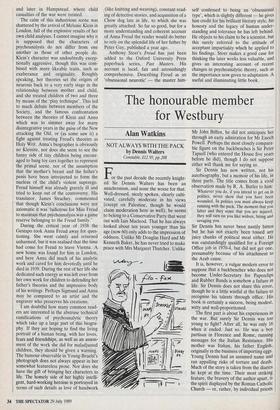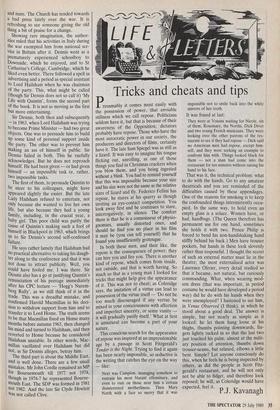The honourable member for Westbury
Alan Watkins
NOT ALWAYS WITH THE PACK by Dennis Walters
Constable, £12.95, pp.208
or the past decade the recently knight- ed Sir Dennis Walters has been an anachronism, and none the worse for that. Well-dressed, nicely spoken, clearly culti- vated, carefully moderate in his views (except on Palestine, though he would claim moderation here as well), he seems to belong to a Conservative Party that went but with kin Macleod. That he has always looked about ten years younger than his age (now 60) only adds to the impression of oddness. Unlike Mr Douglas Hurd and Mr Kenneth Baker, he has never tried to make peace with Mrs Margaret Thatcher. Unlike Mr John Biffen, he did not anticipate her through an early admiration for Mr Enoch Powell. Perhaps the most closely compara- ble figure on the backbenches is Sir Peter Tapsell (who entered the House five years before he did), though I do not suppose either will thank me for saying so.
Sir Dennis has now written, not his autobiography, but a memoir of his life, in three parts. The title comes from a vivid observation made by R. A. Butler to him: . Whatever you do, if you intend to get on in politics, never show that you have been wounded. In politics you must always keep running with the pack. The moment that you falter and they sense that you are injured, they will turn on you like wolves, biting and savaging you.
Sir Dennis has never been nastily bitten but he has not exactly been tossed any juicy chunks of political meat either. He was outstandingly qualified for a Foreign Office job in 1970-4, but did not get one, presumably because of his attachment to the Arab cause.
It is, however, a vulgar modern error to suppose that a backbencher who does not become Under-Secretary for Paperclips and Rubber Bands is somehow a failure in life. Sir Dennis does not share this error, though he is a little wistful at the failure to recognise his talents through office. His book is certainly a success, being modest, witty and well-proportioned.
The first part is about his experiences in the war. But surely Sir Dennis was too young to fight? After all, he was only 16 when it ended. Just so. He was a boy partisan in Florence and Rome, running messages for the Italian Resistance. His mother was Italian, his father English, originally in the business of importing eggs. Young Dennis had an assumed name and ran appalling risks of torture and death. Much of the story is taken from the diaries he kept at the time. Their most striking feature, the bravery of the author apart, is the spirit displayed by the Roman Catholic Church — or, rather, by individual priests and nuns. The Church has tended towards a bad press lately over the war. It is refreshing to see someone giving the old thing a bit of praise for a change. Showing rare imagination, the author- ities ruled that his activities in Italy during the war exempted him from national ser- vice in Britain after it. Dennis went as a Prematurely experienced schoolboy to Downside, which he enjoyed, and to St Catharine's College, Cambridge, which he liked even better. There followed a spell in advertising and a period as special assistant to Lord Hailsham when he was chairman of the party. This, what might be called (though Sir Dennis does not so call it) 'My Life with Quintin', forms the second part of the book. It is not as moving as the first but more entertaining. Sir Dennis, both then and subsequently — in 1963, when Lord Hailsham was trying to become Prime Minister — had two great Objects. One was to persuade him to build Up some kind of personal support inside the party. The other was to prevent him making an ass of himself in public. Sir Dennis failed in both. This he ruefully acknowledges. But he does not reproach himself. He had been given — or had given himself — an impossible task or, rather, two impossible tasks.
The first of them, to persuade Quintin to be nicer to his colleagues, might have appeared slightly the easier. But the late Lady Hailsham refused to entertain, not only because she wanted to live her own life, but also because they had a young family, including, in the crucial year, a baby girl. This poor child was partly the cause of Quintin's making such a fool of himself in Blackpool in 1963, which brings US to Sir Dennis's second self-confessed failure.
He says rather lamely that Hailsham had no practical alternative to taking his daugh- ter along to the conference and that it was not done to attract publicity. Well, you e43.uld have fooled me. I was there. Sir Dennis also has a go at justifying Quintin's renunciation of his peerage immediately after his CPC lecture — `Flogg's Nurem- berg Rally', as we still think of it in the trade. This was a dreadful mistake, and Confirmed Harold Macmillan in his deci- sion to withdraw support from him and to transfer it to Lord Home. The truth seems to be that Macmillan fixed on Home many months before autumn 1963, then changed his mind and turned to Hailsham, and then reverted to Home because he considered Hailsham unstable. In other words, Mac- millan vacillated over Hailsham but did not, as Sir Dennis alleges, betray him. The third part is about the Middle East, and is well done. There are a few small mistakes. Mr John Cordle remained an MP for Bournemouth till 1977 not 1974, though in 1974-7 he represented Bourne- mouth East. The SDP was formed in 1981 not 1982. And the late Sir Clyde Hewlett was not called Clive.



















































 Previous page
Previous page